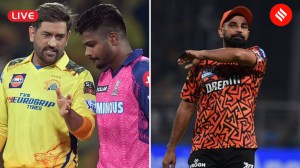Sharad Pawar, the grand old man never at sea
By distancing himself from Opposition offensive against Adani, and its stalling of Parliament, the NCP chief again holds out the lesson: don't take him for granted, be ready for surprises
 As the Opposition was left aflutter and tried to contain the impact of the words of a man whose heft would be needed for any anti-BJP front, Pawar again held his own. (Express Photo By Ganesh Shirsekar)
As the Opposition was left aflutter and tried to contain the impact of the words of a man whose heft would be needed for any anti-BJP front, Pawar again held his own. (Express Photo By Ganesh Shirsekar)
Sharad Pawar, the ultimate politician who knows well to keep friends close, enemies closer and both guessing, has done it again.
His remarks on Friday in an interview to NDTV, distancing himself from the offensive against Gautam Adani over his alleged links with the Modi government as well as the tactic of stalling Parliament over it, could not have come at a worse time for the Opposition. The Adani issue was one on which the anti-BJP parties had just begun to see an opening to that elusive unity.
As the Opposition was left aflutter and tried to contain the impact of the words of a man whose heft would be needed for any anti-BJP front, Pawar again held his own. Differences within parties, he said Saturday, were not surprising, nor would they in any way hurt Opposition unity.
However, the old fox knows better – as do those who know him. Through his long career in politics, and arduous rise to the top, Pawar has hardly ever toed the line “expected” of him, even if it has meant shifting loyalties. Nor has he ever been apologetic about his pro-business outlook – as reflected in his remarks on Adani in the NDTV interview – in a political atmosphere that sees convenience in leaning the other way.
Pawar’s views on Adani, whose various infrastructure initiatives he mentioned in the interview, aren’t new either. In his autobiography Lok Maze Sangati, Pawar had showered praises on the self-made tycoon from Gujarat as “a hardworking young businessman”, and counts the Adani Group head as a friend.
During the coalition government of the Maha Vikas Aghadi (MVA), itself a Pawar handiwork, bringing together the unlikely combination of the Congress and Shiv Sena, Adani had been invited to Pawar’s home turf of Baramati as chief guest for a programme. Pawar’s grandnephew himself drove Adani around at the time.
Pawar has also been a special guest of Adani in Ahmedabad on several occasions.
Given that the latest Pawar punch seems targeted specifically at Rahul Gandhi – who is leading the campaign against Adani – and comes at a time when the disqualified MP needs all the help he can get, speculation has begun in Maharashtra about what the NCP chief is up to.
One of the talking points is whether the Pawar remarks are a precursor to the BJP and NCP coming together. Those of this view argue that the Shinde Sena-BJP government remains shaky as the final call on the Shiv Sena split has not yet been taken. Should the Supreme Court rule against Eknath Shinde and disqualify him, the BJP would need numbers to stay in power, with elections a year away.
A senior Congress leader and former Union minister said Pawar was wrong in giving more importance to the Court than Parliament, in dismissing the Congress demand for a JPC probe. “In a democracy, Parliament is supreme. A JPC probe would result in tabling of documents, witnesses coming in front of the committee and public scrutiny. What is wrong in openly sharing the information if nothing wrong has been committed?” the leader said.
He also argued that Pawar’s remarks were a pressure tactic to enhance the bargaining power of smaller parties like the NCP ahead of seat talks for any Opposition unity. “While Pawar’s remarks were in support of Adani, they were also to counter Rahul Gandhi,” he said.
If the NCP changes sides, it won’t be the first such somersault by Pawar. In 1999, when he split from the Congress to form the NCP, it was on the issue of Sonia Gandhi’s “foreign origins”. As a senior Congress leader, he expected the crown of party chief that had passed on to Sonia.
Then, while the NCP fought the state polls against the Congress in 1999, the same year, it joined hands with the Congress. After that, it remained a partner with the Congress through thick and thin for 15 years. Pawar was a senior minister in the Congress-led UPA government at the Centre, which incidentally had the imprint of Sonia all over.
In 2014, months after the Modi wave swept the BJP to power at the Centre, the NCP did not tie up with the Congress in Maharashtra for the Assembly elections, with the two parties fighting separately, like the other two main fronts, Shiv Sena and BJP.
Then, after the results, Pawar pulled a surprise and extended outside support to the BJP, paving the way for Devendra Fadnavis to become the first BJP Chief Minister of Maharashtra. The BJP was 22 short of a majority then, and following the unconditional and unsolicited support from Pawar, no official vote of trust took place.
Five years later, after the 2019 Assembly elections left the BJP without a majority, Pawar swooped in to fish for BJP partner Shiv Sena in the alliance’s troubled waters. A disgruntled Uddhav
Thackeray, whose wish to become CM was turned down by the BJP, was only too eager as Pawar put together an alliance with the Sena, NCP and Congress to form the MVA government.
But even then, Pawar’s role kept all sides guessing. His trusted nephew Ajit Pawar in a midnight surprise sprung up at the side of Fadnavis to get sworn in as Deputy CM in a purported BJP-NCP coalition. That lasted barely a day or so, after Pawar held on to the NCP, and Ajit Pawar returned “chastened” to the family.
Recently, Fadnavis hinted that what many suspected at the time was true, and that Pawar Senior had more than one ball in play. And that Ajit Pawar’s so-called rebellion might have had his blessing.
Ajit Pawar, who leads the NCP in the Assembly and is also the MVA’s Leader of Opposition, incidentally has kept the pot boiling over the exact nature of his relationship with the BJP. His handling of Fadnavis with kid gloves is cause for much heartburn in the MVA’s ranks.
Ironically, the same Pawar who once left the Congress over Sonia Gandhi perhaps prefers now that she was back running the show. It is no secret that the NCP veteran and Rahul, the de facto Congress leader, do not share a very cordial relationship.
According to sources, Pawar finds a communication gap with the Congress, especially after the death of Ahmad Patel, with no senior leader of commensurate stature able to speak for the Congress. Some had hoped the elevation as Congress president of Kharge, a veteran himself, would remedy that. However, no one – least of all Pawar — believes Kharge has the last word in the Congress.



- 01
- 02
- 03
- 04
- 05




























